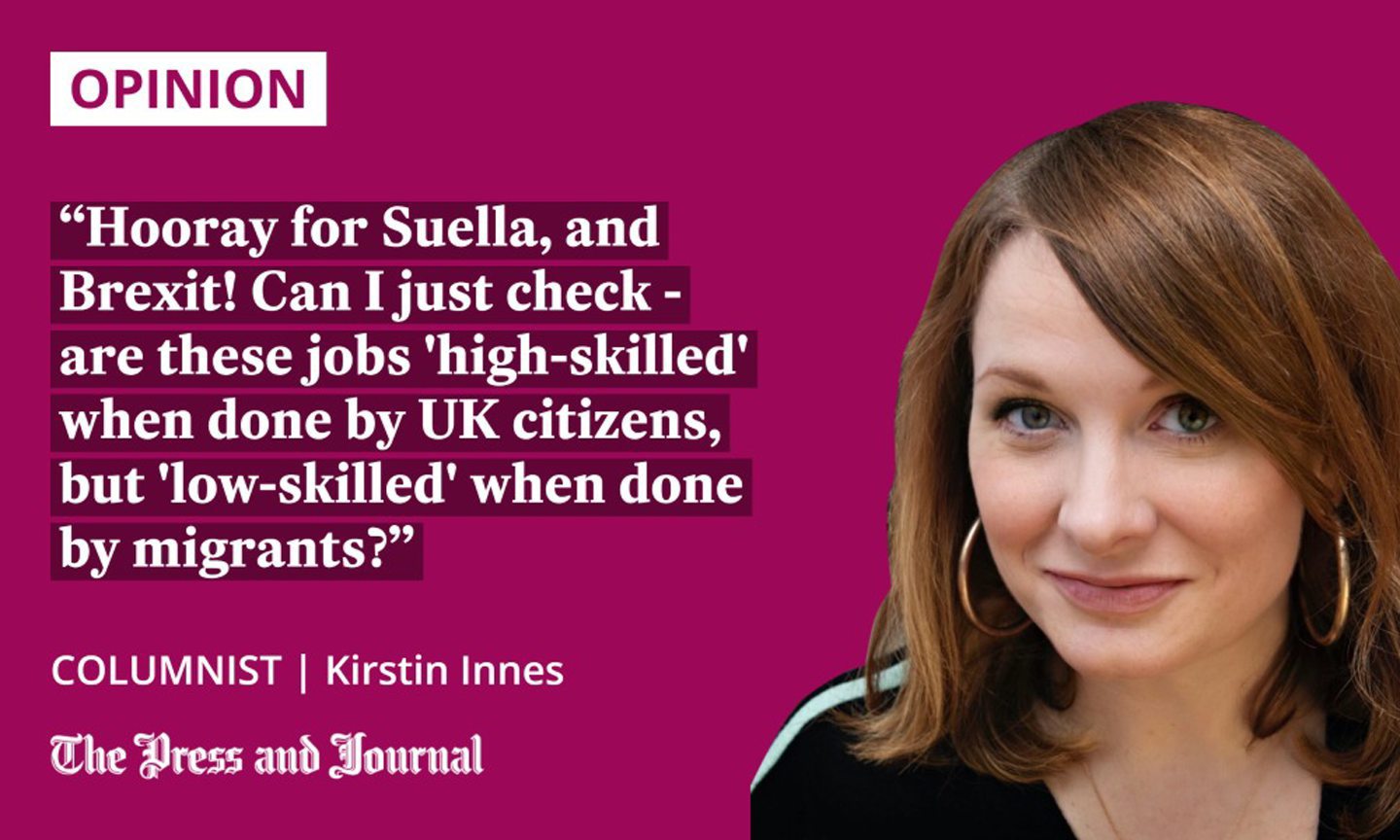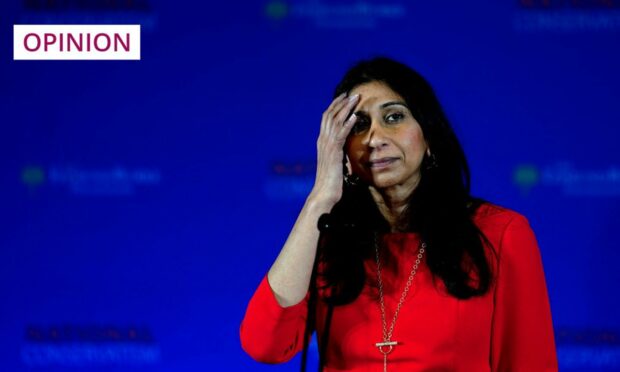This week, in a speech which was leaked in advance to every media outlet in the country, Suella Braverman unofficially auditioned to be her party’s 32,546th (approx) prime minister since 2012.
As the “star turn” at the newly-minted, hard right National Conservatism Conference, the home secretary announced that we no longer need foreign workers in the UK.
“There is no good reason why we can’t train up enough HGV drivers, butchers or fruit-pickers. Brexit enables us to build a high-skilled, high-wage economy that is less dependent on low-skilled foreign labour,” she said.
Hooray for Suella, and Brexit! Can I just check – are these jobs “high-skilled” when done by UK citizens, but “low-skilled” when done by migrants? Because HGV driving looks pretty difficult to me, and butchery is currently classed by the government as a “skilled trade” in migration terms .
Or is it that these “high-skilled” jobs are being done by foreigners who lack the skills because of their innate foreignness?
Minimum-wage fruit-picking is not classed as “high-skilled”; is the home secretary suggesting that, in this exciting new Brexit Britain that will be starting like, really, really soon, fruit-picking will be reclassified as a high-skilled role with commensurate high wages for local people?

I’m also interested in who we’re classifying as “high” and “low” skilled workers. The binary suggests that there is a meaningful and easily-defined divide. (The subtext suggests that “high” and “low” are the markers of a human’s worth to our society, but more of that later.)
The UK Government’s current immigration guidance says “a skilled worker is someone who will be working in a job role in the UK that is deemed to have a skill level of RQF3 or above, (equivalent to A Level)”. That suggests that there’s an educational dimension to the definition and, where high skills equal high wages, that means a junior doctor with seven years of training and four years of practical experience on the job should definitely not be earning less than half the salary of, say, an MP… Oh. Wait a second.
A Braverman New World
Don’t worry. The home secretary herself offered a definition in a speech last year, when she pinpointed the sort of migrants she didn’t want in her Braverman New World. “Those people are coming here, they’re not necessarily working or they’re working in low-skilled jobs, and they’re not contributing to growing our economy,” she said.
OK, so that’s something to work with, right? Low-skilled jobs are those that do not contribute to growing our economy. We can assume, then, that the people doing those jobs – whether migrants or not – are not of economic value.
Here are a few wee picks from the government’s list of those occupations which do not qualify for a Skilled Worker Visa and, therefore, are not contributing to growing the economy: janitors, librarians, road construction operatives, farm workers (er…), street cleaners and bin men, waiting and bar staff, postal workers, HGV drivers (hang on… I thought…?), prison officers, nursery nurses and childminders, care workers and home carers.
So, there we go. Clearly, in order to grow, our economy does not need its refuse to be collected, its post to be delivered, its mess to be cleaned, its agricultural or nightlife industries to function, its prisons to be run, its elderly people and preschoolers to be cared for while their children or parents work, or its, um, HGVs to be driven? Sounds like a great place to live.
No vision, just meaningless soundbites
Anyway, back to the fruit. One of the reasons that fruit-picking is traditionally done by a short-term migrant labour force is because it’s seasonal work. Braverman’s glossy speechifying lacks a fundamental appreciation of the fact that the agricultural sector needs a large influx of people to work long hours at a physically gruelling job every day for only about one month a year, on minimum wage.
The extreme physical toll of the job means it better suits younger, stronger people. The fanciful suggestion that pensioners could be brought in to supplement the labour gap during the 2020 fruit-picking crisis was dismissed for just this reason.
The 7am start time means it isn’t going to suit people who, say, have to get their children to school. And what do these people do for the other 11 months?
Is the government going to support them with high wages to hone their skills? Or, perhaps create a joined-up programme of seasonal work, looking across other sectors which have similar short-term needs, creating long-term job security and stability in the sector? No, of course they aren’t.
There is no ability, vision or willingness in Westminster to treat the country (and its economy) as a whole, interconnected entity; there is only the creation of catchphrases that will look good on the next day’s front pages.
Whatever – this isn’t Suella’s business. She’s the home secretary, not the minister for employment. Her job is apparently to stand in front of a microphone, throwing out punchy but ultimately meaningless soundbites, and explaining why it’s not racist to use government policy to stoke racial division. She’s highly-skilled.
Kirstin Innes is the author of the novels Scabby Queen and Fishnet, and co-author of non-fiction book Brickwork: A Biography of the Arches













Conversation